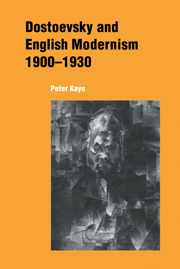Book contents
- Frontmatter
- Contents
- Acknowledgments
- 1 Introduction
- 2 Prophetic rage and rivalry: D. H. Lawrence
- 3 A modernist ambivalence: Virginia Woolf
- 4 Sympathy, truth, and artlessness: Arnold Bennett
- 5 Keeping the monster at bay: Joseph Conrad
- 6 Dostoevsky and the gentleman–writers: E. M. Forster, John Galsworthy, and Henry James
- Conclusion
- Notes
- Selected bibliography
- Index
2 - Prophetic rage and rivalry: D. H. Lawrence
Published online by Cambridge University Press: 22 September 2009
- Frontmatter
- Contents
- Acknowledgments
- 1 Introduction
- 2 Prophetic rage and rivalry: D. H. Lawrence
- 3 A modernist ambivalence: Virginia Woolf
- 4 Sympathy, truth, and artlessness: Arnold Bennett
- 5 Keeping the monster at bay: Joseph Conrad
- 6 Dostoevsky and the gentleman–writers: E. M. Forster, John Galsworthy, and Henry James
- Conclusion
- Notes
- Selected bibliography
- Index
Summary
Like Birkin in his wrestling match with Gerald, Lawrence struggled with fierce intensity against Dostoevsky, a hated and loved rival whose strength flowed from the decadence of modernity. Lawrence grappled with him as a false prophet, a false artist, whose works endorsed the modern sickness and its symptoms of self-division, egoism, cankered sensualism, and devouring consciousness. Repeatedly, Lawrence stalked his rival in letters, essays, reviews, and fiction. His assaults blur, but cannot mask, his affinity with the passionate visionary who evoked a “subterranean love” and a reluctant “great admiration.”
Lawrence felt the cloying presence of his rival because the height of Dostoevsky's English influence coincided with his own most creative and troubled years. Lawrence's closest friends, including Jessie Chambers, Edward and Constance Garnett, S. S. Koteliansky, and Middleton Murry, admired Dostoevsky with an irritating ardency. Murry's zeal proved especially galling; in a move tantamount to John the Baptist abandoning the camp of the Nazarene, he exchanged devotion to Lawrence for the worship of his rival. Lawrence's correspondence with Murry and others shows how his views were antithetically shaped, or misshaped, by his friends and the prevailing literary climate.
Lawrence's essays and fiction help to explain his judgment and the mutable complexity of his values. The theoretical essays illuminate the bitter depths of his response, especially his charge that Dostoevsky embodied a diseased mental consciousness. The essays about other Russian, American, and Italian authors are equally useful, for Dostoevsky became an inverse and self-reflective measure of value.
- Type
- Chapter
- Information
- Dostoevsky and English Modernism 1900–1930 , pp. 29 - 65Publisher: Cambridge University PressPrint publication year: 1999



